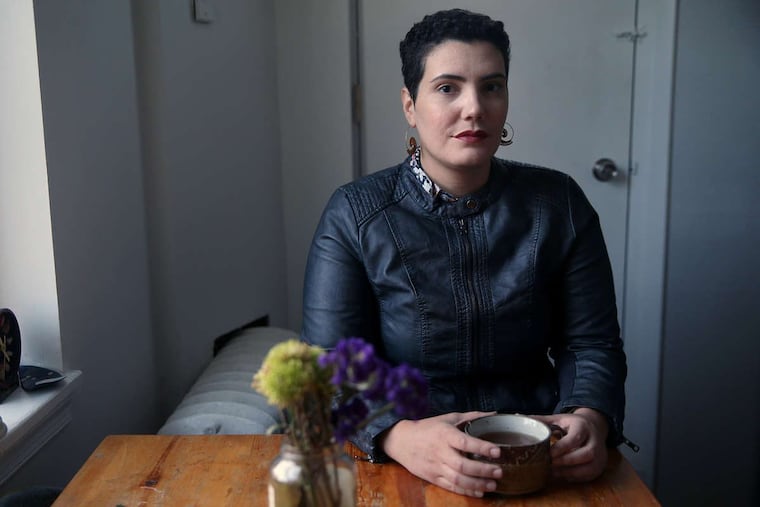Meet Philadelphia's new poet laureate, Raquel Salas Rivera: Poet, migrant, bridge-builder
Rivera is a fine poet, bridging notions of class, race, gender, sexual identification, language, and geography. The new poet laureate plans to bridge neighborhoods, too.

PLEASE NOTE: Because of wintry weather, the Poet Laureate reading at the Free Library has been postponed until 6:30 p.m. on Tuesday, Jan. 9.
Philadelphia's new poet laureate is a bridge-builder.
Raquel Salas Rivera is the new adult poet laureate of Philadelphia for 2018-2019, succeeding Yolanda Wisher. In a ceremony scheduled for 6:30 p.m. Monday in Room 108 of the Free Library of Philadelphia, Beth Feldman Brandt, who chairs the selection committee, will make the announcement. The new laureate will read, as will Husnaa Hashim, announced in September as the new youth poet laureate.
Rivera, 32, is a networker, bridging people of different geographical situations (as a Puerto Rican and Philadelphian), languages (writing in Spanish and English), and races ("I'm a very white-passing Puerto Rican, with a very fair father and a mother much blacker than I am"). As a person identifying as queer and nonbinary (that is, not fitting traditional categories of male or female), Rivera bridges sexual/gender identifications, as well as social/economic classes ("my mother has slavery in her background, my father much more wealth and access to privilege"). The new poet laureate talks about the great news and plans for the laureateship.
How does it feel?
After that first "What just happened?" sort of shock, there was definitely excitement about what this meant, my being a bilingual poet, what it means for migrant communities, what it means symbolically, and the work I want to do in Philly, and I got hyped. What a great thing to happen.
You were born in Puerto Rico, came to the United States at 6 months old with your parents, then moved to Puerto Rico – one can't really say "back" – at 14 to live with your mother. You came to Philadelphia when you were accepted to Penn. That makes for a very complex relationship with country and city.
I had never really considered going back to the United States. But of all the places I visited, I really liked Philadelphia and the idea of being here. It was important that I feel at home, really comfortable. I'm queer, nonbinary, and I needed to be in a place where I wouldn't feel isolated. And when I came here, I was lucky to find so many different spaces where my work was welcomed. I didn't expect that. Often, the United States is seen as monolingual, and that's not the case at all. I was writing a lot of poetry around identity and being a migrant in the United States, and the politics of language, and I found people were super-receptive. I usually read the Spanish first and then the English. And people were super into it.
I also just really thought the city was really beautiful. My plan was go back eventually to Puerto Rico, but then I fell in love with a Philadelphian, Philly-raised. I learned a lot about Philly through her.
As a Puerto Rican, and as a person self-identifying as a migrant, you have very mixed feelings about this country, with its burdened colonial past, its prejudices, its class structure. Yet here you are.
I don't identify as an American, but I identify as a Philadelphian! That's a common experience for a lot of people, often unspoken. This is a huge country, and every place is really different, and beyond the U.S. political borders, many people identify with regions, with cities and towns. To say "I'm an American" is a political statement, and "I'm a Philadelphian" is an identity locator.
You're going to be a poet laureate, meaning you're about to get really into Philadelphia, a city of neighborhoods.
I've never seen anywhere else the post of a city's poet laureate be what it is in Philly – a position of such significant social service. There is so much to do, neighborhood to neighborhood and culture to culture. We do have bridge-builders here: Poets like Kirwyn Sutherland and Yolanda Wisher are moving between spaces. Yet Philly is still very segregated along racial lines, and people often stay within their communities. There are ways of changing that, putting people into spaces they wouldn't ordinarily be in. And that's something I put in my application that I wanted to do. I want to do a series called We, Too, Are Philly, based on Langston Hughes' poem "I, Too," in which we involve poets of color and poets of more than one language in different activities.
Philly has so many incredible poets here for a city of its size. There's so much going on in the sanctuary movement, this being a sanctuary city, so much good stuff being written about the immigrant and sanctuary experience. Maybe it's the time for it.